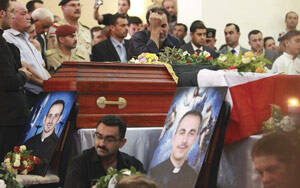Catastrophe is the term Samir Sumaida’ie, Iraq’s ambassador to the United States, used to describe the attack on Baghdad’s Syriac Catholic Cathedral on Oct. 31, not only because of the loss of life at Our Lady of Salvation, but what the assault could mean in the near term for the nation. Fifty-two people were killed (along with six attackers) and 78 were wounded when Iraqi Security Forces stormed church offices where Al Qaeda-linked terrorists had trapped about 100 Mass-goers.
“It is an extremely painful experience not only for the Christians of Iraq, but for all Iraqis,” the ambassador said. “Personally I was very shocked and saddened,” he said. Ambassador Sumaida’ie fears that the steady departure of Iraq’s Christians over years of conflict could now accelerate into an outright “stampede.” Since 2003 Iraq’s Christians, a community as old as the faith itself, have diminished from an estimated 900,000 to about half that number today. The loss of its Christians “would be extremely damaging for Iraq,” the ambassador said, not only for the cultural devastation the departure of the community would represent but also because of the essential role of highly skilled Christians in Iraq’s reconstruction and recovery.
The Syriac Catholic Bishop of Baghdad, Ignatius Metti Metok, told British media he has lost half his congregation since the attack on the cathedral. “My people say to me: ‘You want us to stay after what’s happened? It could happen again, and who’s going to protect us?’ We tell them, the church is against emigration, we have to stay here, whatever the sacrifices, to bear witness to our faith. But people are human, and we can’t stop them leaving.”
During a Mass in Great Britain on Nov. 7, Archbishop Athanasios Dawood of the Syrian Orthodox Church in London said the cathedral attack amounted to “genocide” and urged Christians in Iraq to flee. He accused the United States of empty promises of democracy and human rights and called on the British government to grant Christian Iraqis asylum.
According to Ambassador Sumaida’ie, Iraq’s Prime Minister Nouri al-Maliki has ordered significant security improvements around Christian churches. He said responses like the archbishop’s were understandable after such a tragedy, but noted other Christian leaders were urging Iraqi Christians to stay put. “They are saying, ‘This is our country and we will never leave,’” he said. “We have a common enemy here and this is also a mortal enemy of the United States, religious extremism as represented by Al Qaeda.
“Al Qaeda and those who travel in that orbit” have been extremely “resourceful and clever in selecting targets with the maximum impact,” Ambassador Sumaida’ie said. Their attacks not only provoke social disruption within Iraq, they encourage international misgivings about the nation’s future. After the most recent attacks, international media images “painted a picture of Iraq again descending into chaos.” But according to the ambassador, for many in Iraq life is returning to something close to normal. As he spoke, however, bombings were reported on Nov. 8 in the normally calm holy cities of Najaf and Karbala, killing at least 22 people and wounding dozens more. On Nov. 10 bombs exploded outside Christian homes across Baghdad, killing four and wounding 10.
The ambassador said he was disturbed to hear voices in Congress talk of scaling back or cutting off aid to Iraq. “The United States should continue to help us strengthen our security forces in all aspects, from operations to intelligence to logistics,” he said. At the same time, Ambassador Sumaida’ie did not believe the United States needed to reconsider its timeline for a withdrawal from Iraq, which, he said, remains “doable.”
“It’s not the number of [U.S.] combat troops that remain that are important but the quantity and quality of U.S. support to the Iraqi forces…and also [providing] the resources we need to be more effective.” The ambassador said Iraq is making progress on improving its security “but we are not there yet.... Attacks like these teach us that we can’t relax; we can’t become complacent. We must take the fight to this enemy until he is defeated.”








